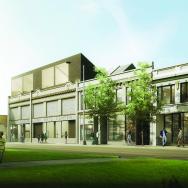Washington Park residents and visitors will soon have another reason to stop, shop and participate in the arts and cultural activity produced on a historic stretch of Garfield Boulevard.
Three new retail tenants—ReformedSchool, Hemp Heals Body Shop and Solo Noir—will be the inaugural fellows and occupants of the newly renovated L1 Creative Business Accelerator and retail shop, the latest addition to the University of Chicago’s Arts Block project.
Located at 319 E. Garfield Blvd., L1 is situated under the Chicago Transit Authority’s Green Line elevated tracks inside of the first “L” station, built in 1892. It is operated and managed by Arts + Public Life (APL), an initiative of UChicago Arts.
“We are thrilled to welcome these outstanding Black-owned businesses to the Arts Block as models for the entrepreneurial possibilities in Washington Park, particularly in these very trying times,” said Isis Ferguson, Arts + Public Life Interim Co-Deputy Director and Assoc. Director of City + Community Strategy. “ReformedSchool, Hemp Heals Body Shop and Solo Noir offer high-quality, imaginative and original products, and their residency at L1 will help them to grow their brands by connecting deeply with the needs and hopes of South Side consumers.”
L1 builds on APL’s commitment to creative entrepreneurship by adding a commerce-focused addition to the Arts Block, an extension of the arts and culture redevelopment efforts on Garfield Boulevard between Prairie Avenue and King Drive. Those efforts include the Green Line Performing Arts Center, which opened in 2018, and the Arts Incubator.
As the city and the University of Chicago move through phased reopening plans, a launch date for L1’s in-person and regular store hours will be announced soon. Visit shopL1.org to learn more about the new L1 businesses and to support them online.
Peter Gaona, owner of ReformedSchool, combines art, fashion and eco-friendly materials, selling unique items to wear and dress your home that highlight, history, social justice and pop culture. Tiffany Joi, owner of Hemp Heals Body Shop, provides luxurious bath and body products including CBD oil drops, pain relief salves, bath salts and whipped body butter. Andrea Polk, owner of Solo Noir, an all-natural skincare and grooming brand for men of color, offers many two-in-one multipurpose products, tools and techniques created to restore confidence through clear, healthy skin.
As part of their 20-month fellowships at L1, these three South Side creative entrepreneurs will move into their first brick-and-mortar space—700 square feet furnished with custom-made millwork designed and fabricated by local master craftsman Norman Teague. By developing and implementing sustainable growth models that support both in-person and online sales, they seek to simultaneously scale their businesses while bolstering the economic vitality of the community.
“The L1 storefront is a welcome and timely addition to Garfield Boulevard, and signals that high-quality commerce is no longer just a possibility but a reality well-suited to succeed on the South Side, right here in Washington Park,” said 3rd Ward Alderman Pat Dowell. “I am supportive of efforts that recognize the tremendous homegrown talent that exists in this community. We need partnerships like this between small business and the University of Chicago. Garfield Boulevard is an excellent location for ambitious creative entrepreneurs to build upon the arts and culture activity that has made the Arts Block a community destination for the last seven years.”
“I'm originally from the South Side of Chicago, born and raised,” said Joi of Hemp Heals Body Shop. “This is my home base, my people—people that look like me, and the consumers that I want to help heal from the inside out in a natural way. Because of the high rates of ailments such as hypertension, high cholesterol and obesity affecting the African American community, I wanted these areas/communities to be my starting point, and for them to see and support a successful entrepreneur/business owner from our community.”
The inaugural cohort of creative entrepreneurs was selected to participate in L1’s 20-month small business fellowship from a pool of 55 applicants through an open call application and jury review process. The fellowship was developed in partnership with Proximity, the urban planning and social impact arm of The Silver Room Foundation. The jury was composed of small business owners, small business development foundation staff and project partners on the South Side.
To qualify for the fellowship, applicants had to be a previously established business. Jury evaluation of applicants also considered four factors: (1) quality and/or craftsmanship of their arts-based service or product; (2) readiness of the applicant to take advantage of the opportunity, and demonstration that participation in the accelerator would impact ability to scale and grow; (3) commitment to the South Side and an established South Side customer base; and (4) relevance of the product or service to the neighborhood landscape and ecology of other cultural amenities in Washington Park, as well as fit with the other offerings in the store.
“CTA is proud to see its oldest original ‘L’ station house being transformed into a vibrant retail and educational space for local entrepreneurs that reflects the dynamic new energy present in the Washington Park community,” said CTA President Dorval R. Carter, Jr. “We applaud the work UChicago’s Arts + Public Life is doing and we look forward to this dynamic program inspiring even more artistic, retail and economic growth in the area.”
Even with an established customer base and strong annual sales, a move to a brick-and-mortar location is particularly challenging for African American business owners right now. According to federal employment surveys, the nation lost nearly 450,000 active African American business owners during the first quarter of 2020 due to the COVID-19 pandemic. This reality has propelled L1 project partners, Arts + Public Life and Proximity, to modify the L1 Creative Business Accelerator service model and curriculum so that both virtual growth and traditional retail are integrated into the fellows’ plans for scaling their businesses.
During their 20-month fellowships, L1 fellows will receive subsidized retail space, elevation-focused mentorship, and extensive training and educational resources from experts tailored to their specific business needs. They will also receive guidance on business strategy, management, leadership, social responsibility, sales, marketing, brand positioning, finance and business law. Additional curricular support and services will be provided through collaborations with UChicago’s Polsky Center for Entrepreneurship and Innovation and the Institute for Justice Clinic on Entrepreneurship.
“The biggest challenge I have faced being a creative entrepreneur has been adequate funding to support my vision,” said Polk, who founded Solo Noir in 2011. “Funding is essential to compete in this competitive landscape. To have the support of L1 to assist me in growing and scaling my business, and help celebrate the milestones, is unmeasurable. As a small business owner, I look for opportunities that validate me being on the right track, and this opportunity is that validation.”
While the physical space of L1 accommodates up to three small businesses, APL is eager to partner with The Silver Room to provide expanded opportunities to other local creative businesses not enrolled in the initial accelerator cohort. A broader range of creative entrepreneurs will be invited to participate in workshops and lectures, participate in APL's annual Vends + Vibes arts marketplace, and participate in new seasonal vending opportunities designed to utilize the 3,000 square feet of landscaped outdoor space located behind the L1 facility.
“After 20 years helping creative entrepreneurs launch and scale their businesses, I have a keen understanding of the success that comes along with access to the right information, activated networks, and resources,” said Eric Williams, founder of The Silver Room and Proximity. “Now, more than ever before, it's essential to support the intentional rebuilding of Chicago's South and West Side neighborhoods as walkable, workable, livable communities.
“To actively accelerate growth, small business owners of color deserve to be connected with the kind of structure, tools, and collaborative learning models that will reduce barriers to success and advance communities’ prosperity. The Silver Room Foundation is excited to activate our Proximity program in partnership with Arts + Public Life and the University of Chicago with three stellar individuals and their businesses.”
L1 is supported in part by the National Endowment for the Arts, Bank of America and a generous gift from Chicago Booth alum Raymond J. Iwanowski, MBA’97.

